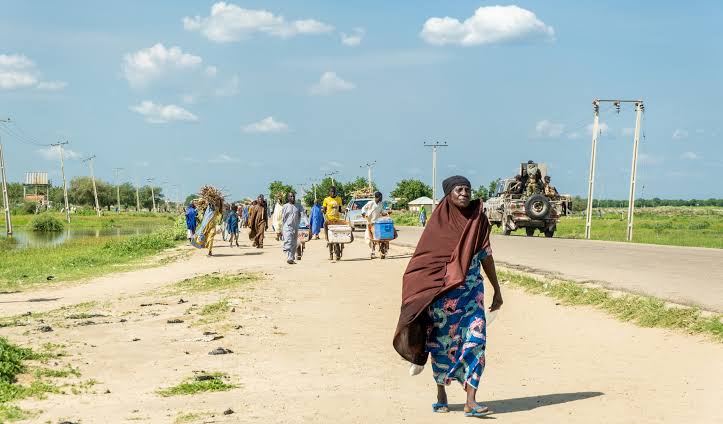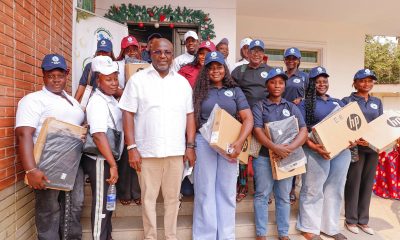National
In Gamboru Ngala, Border Town Life Balances Between Militants, Hunger, and Aid Cuts

BY: ADAMU ALIYU NGULDE, MAIDUGURI
GAMBORU NGALA, Nigeria — Along Nigeria’s northeast border with Cameroon, life in Gamboru Ngala is marked by fear and resilience. More than a decade of Boko Haram violence has hollowed out this once-bustling trading hub, forcing thousands into settlement camps and leaving families dependent on dwindling international aid.
In the crowded displacement camp on the edge of town, Fatima Mohammed, a mother of six, said her family survives on food distributions that now arrive less frequently. “Sometimes I cook only once a day,” she said, cradling her youngest child. “When the food is gone, we sleep hungry. The children ask, but what can I give them?”
Another resident, Abubakar Ali, fled his village five years ago after Boko Haram fighters attacked. He now sells firewood in Gamboru Ngala to support his family. “The militants destroyed my farm,” he said. “I want to go back, but it is not safe. Here, at least, my children can sleep without hearing gunshots.”
But safety is fragile. Militants remain active in the surrounding countryside, ambushing farmers and traders. Civilian Joint Task Force (CJTF) commander, Ibrahim Adamu, said his men patrol daily to prevent raids. “The army cannot be everywhere,” he explained. “We are the eyes and ears of the community. Without us, Boko Haram would overrun this place again.”
Despite local defense efforts, humanitarian groups warn that Gamboru Ngala’s challenges extend beyond security. International donors, including the United States, have reduced funding for aid programs in northeast Nigeria, citing competing global crises. The cuts are being felt in the camps.
Zainab Umar, another displaced mother, said her children used to receive porridge at a school feeding center, but the program has been suspended. “Now they go to class hungry,” she said. “How can they learn like this?”
An international aid worker, who requested anonymity because he was not authorized to speak publicly, said agencies are “facing impossible choices.” He explained: “We can no longer cover everyone’s needs. We prioritize the most vulnerable, but families who once had regular food support are now left waiting.”
The economic impact is equally visible. Traders complain that cross-border movement with Cameroon — once Gamboru’s lifeline — remains heavily restricted. With few opportunities, some young men risk being lured by militants.
“People are caught between hunger and insecurity,” said CJTF leader Ibrahim Adamu. “If nothing changes, more will join Boko Haram just to survive.”
Still, small signs of normalcy endure. A modest market has reopened in town, women run petty trade from their homes, and volunteer teachers hold classes in makeshift classrooms.
“We refuse to give up,” said Fatima Mohammed, the displaced mother. “But we need peace, food, and hope for our children. Without that, life here is only waiting.”
For Gamboru Ngala, daily survival is a fragile balance — between militants and hunger, between aid that is shrinking and resilience that refuses to fade.













